Sir John Monash, Personal Files Book 6, 12 July - 3 August 1915, Part 4
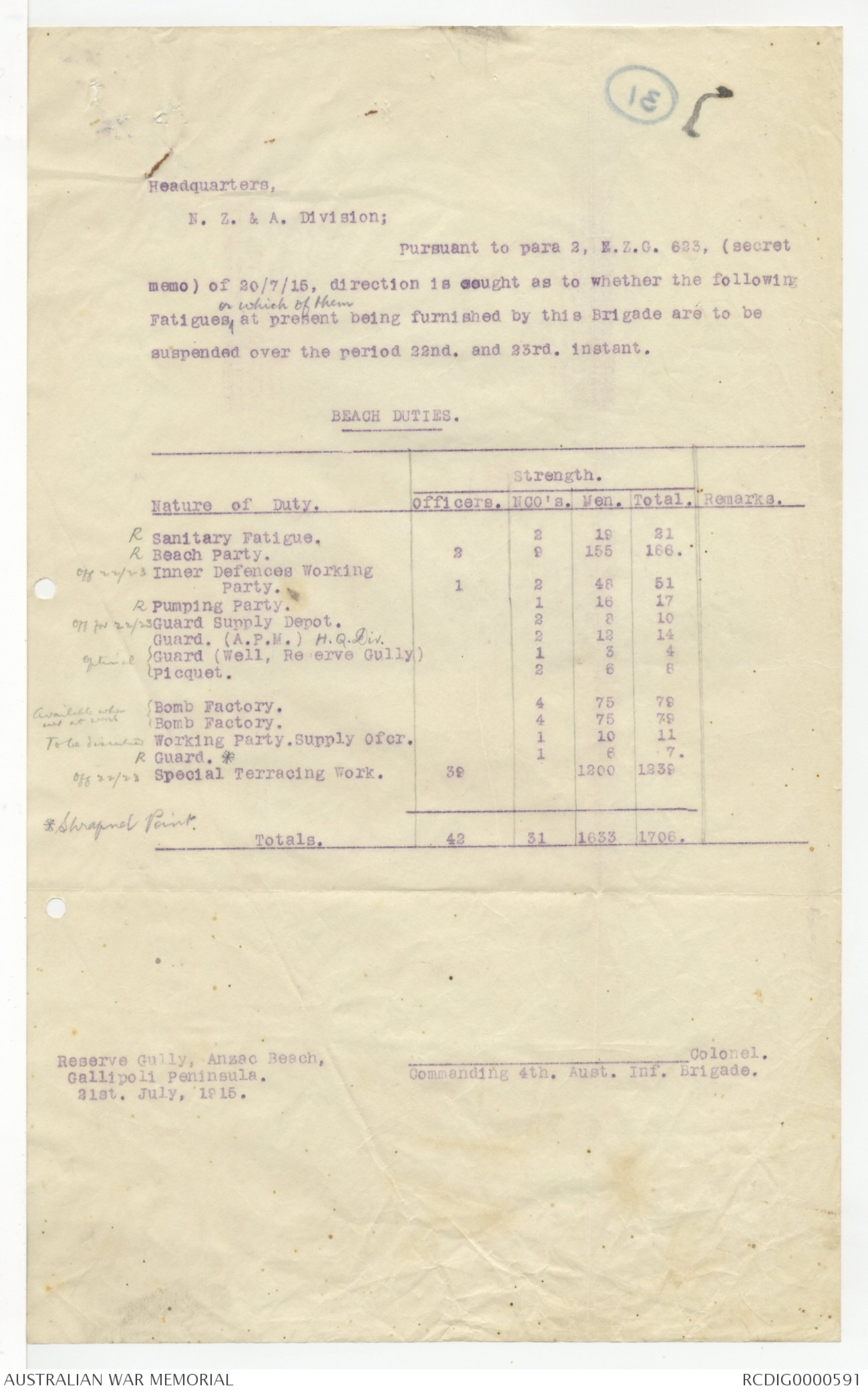
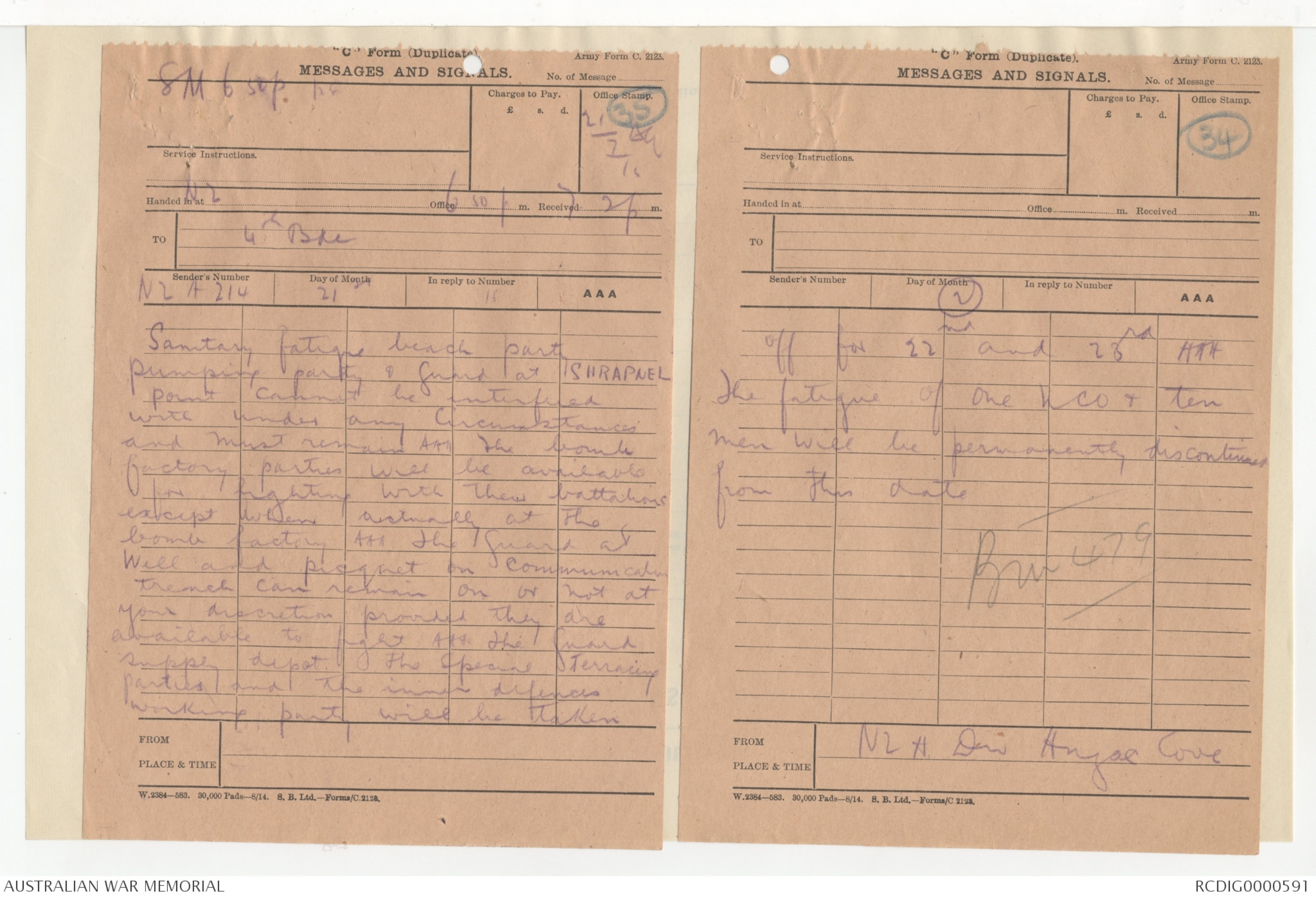
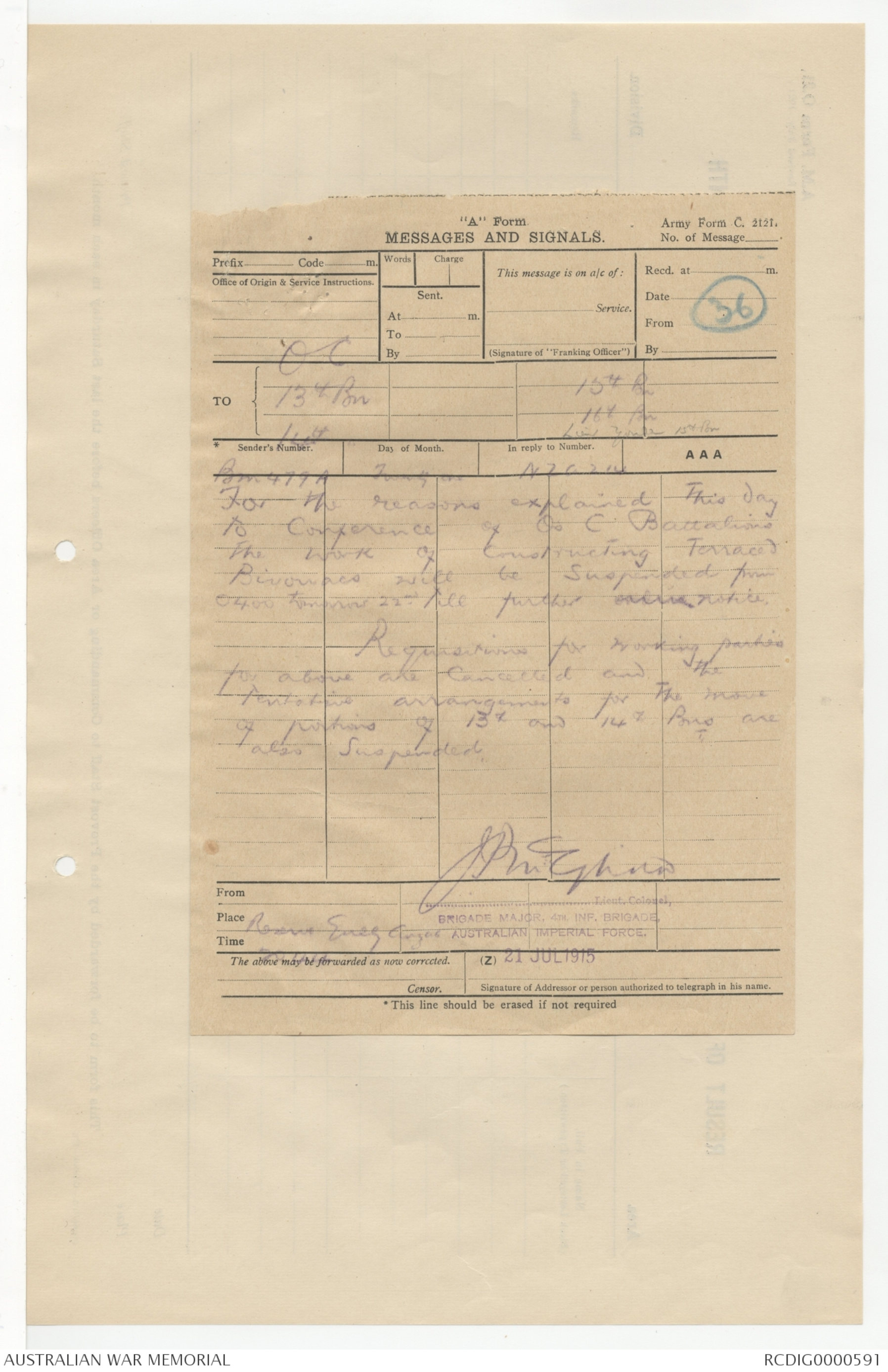
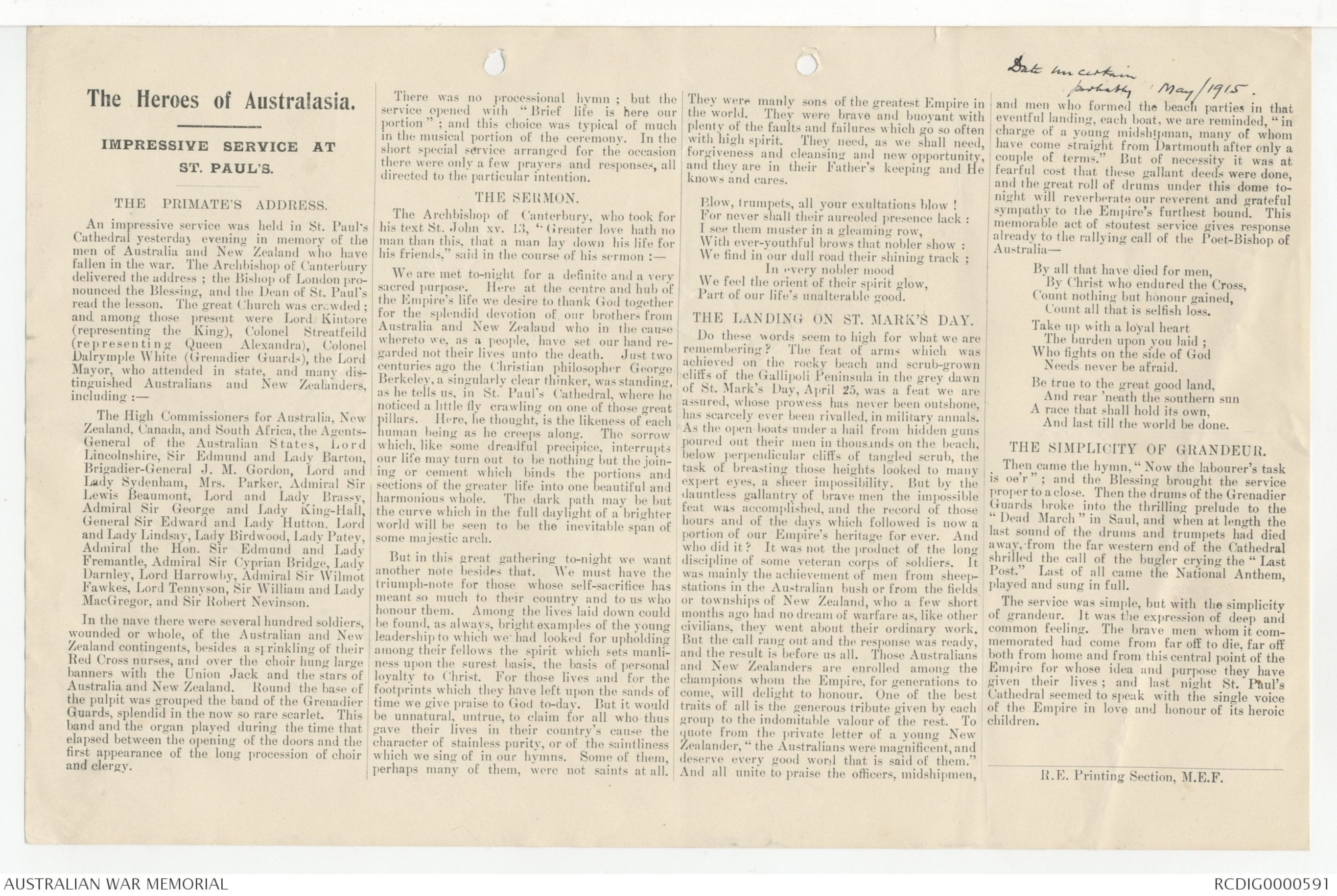
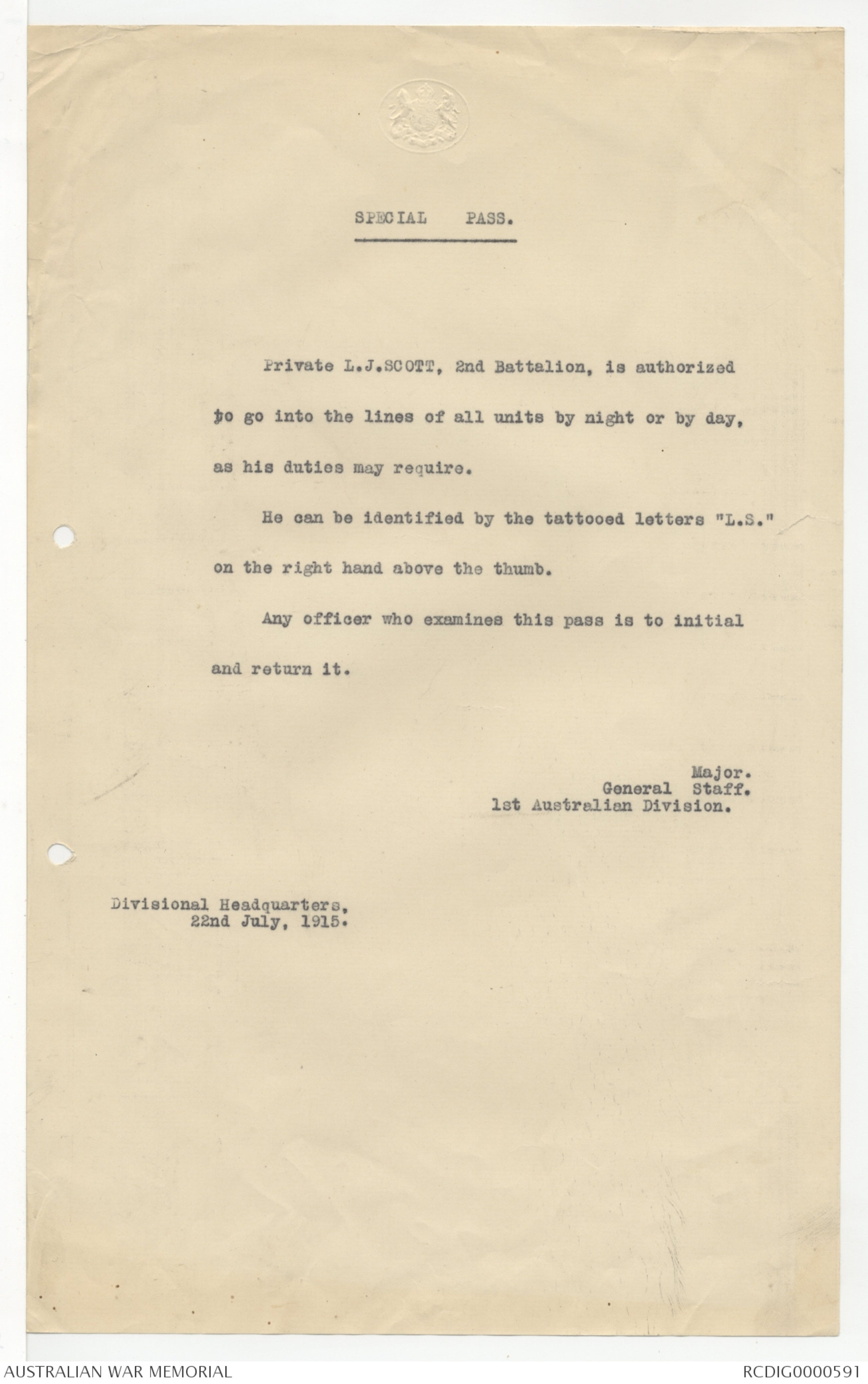
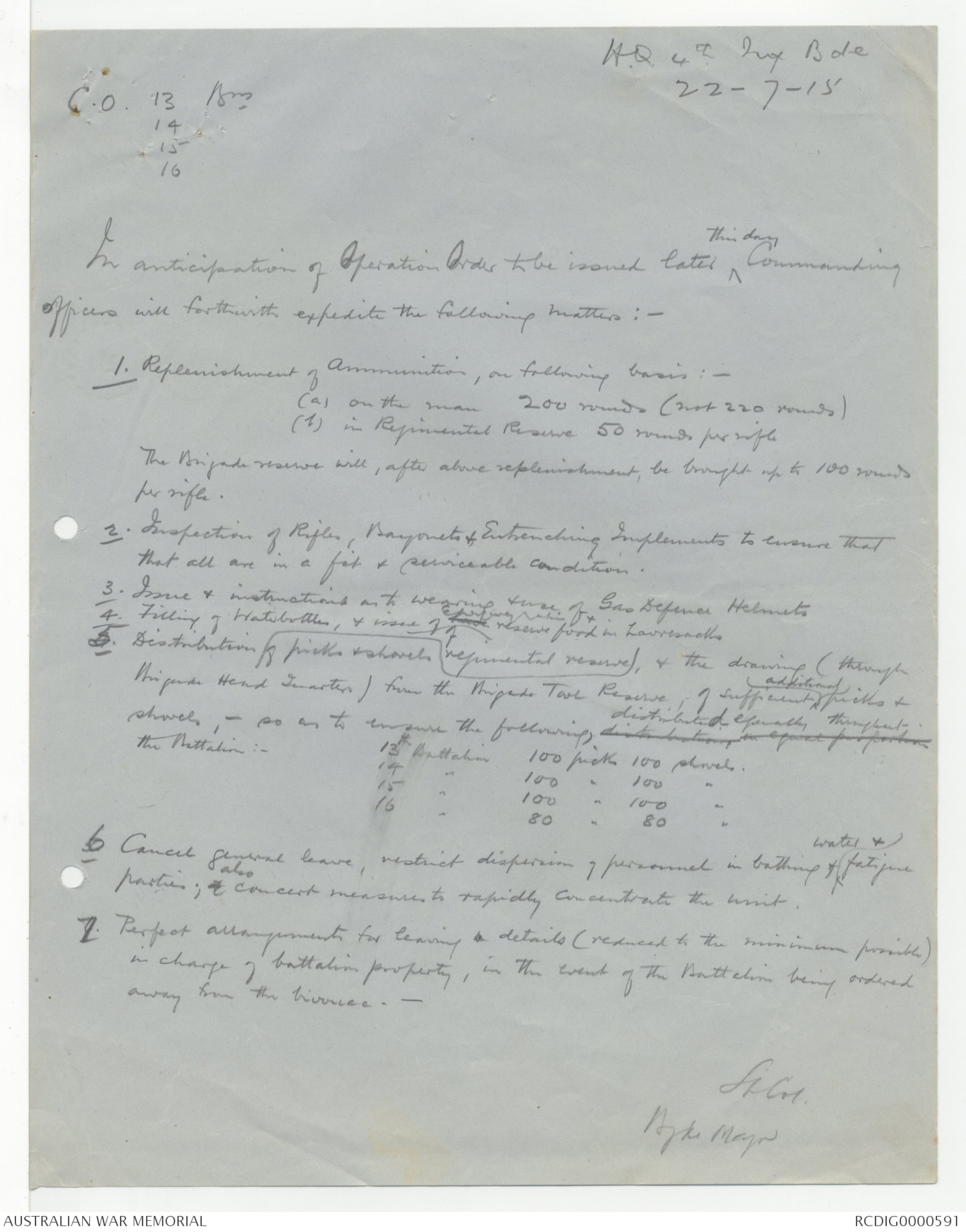
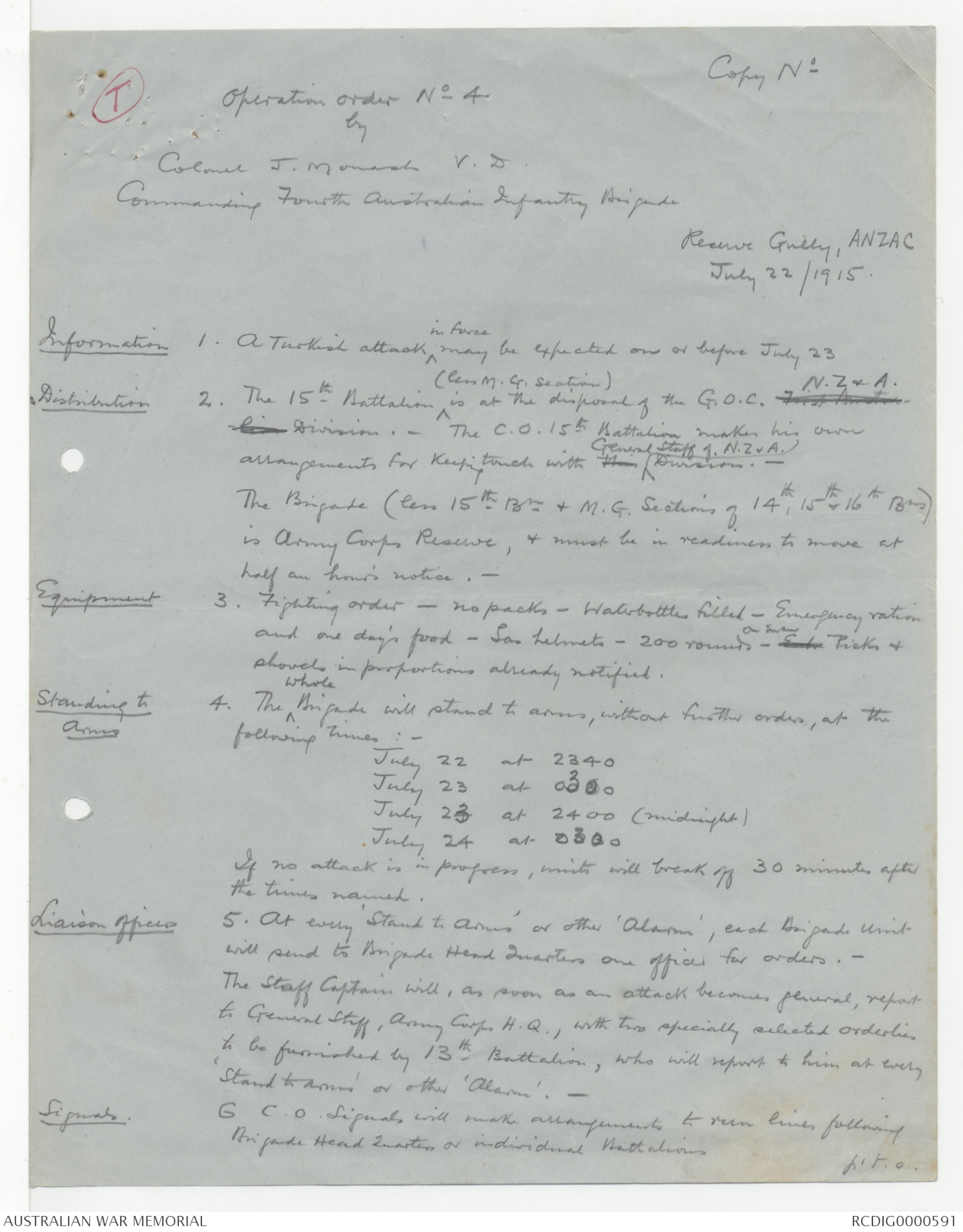
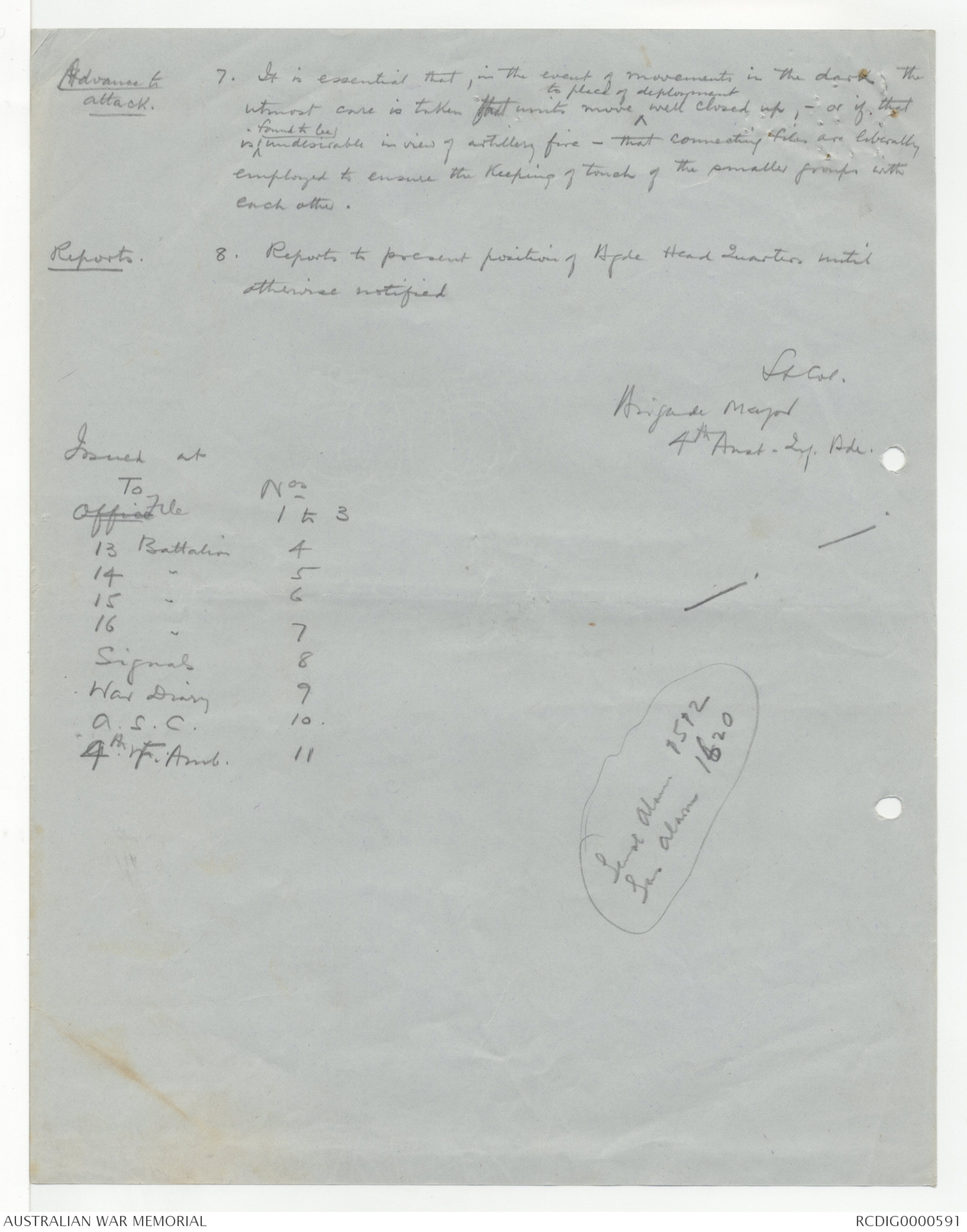
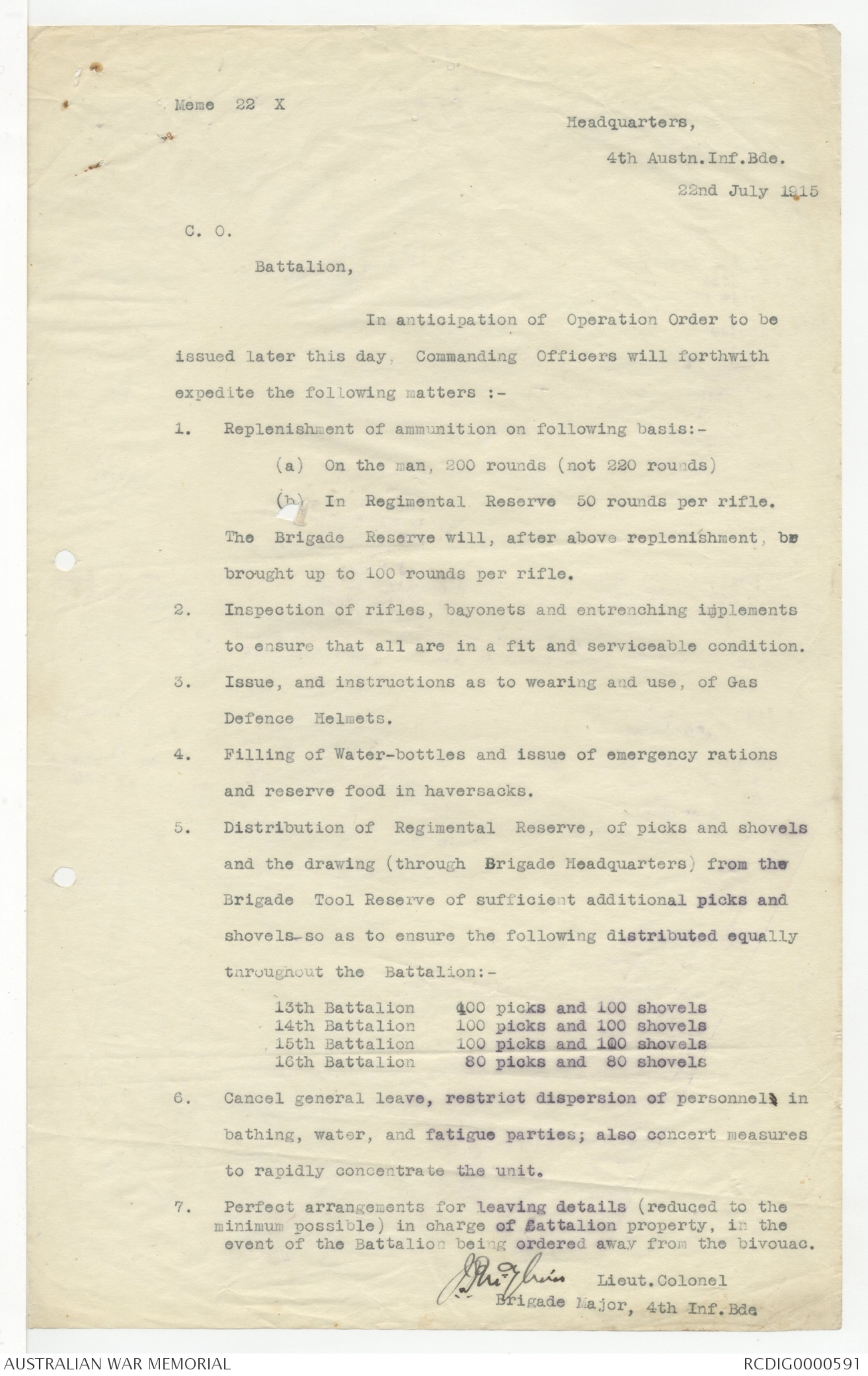
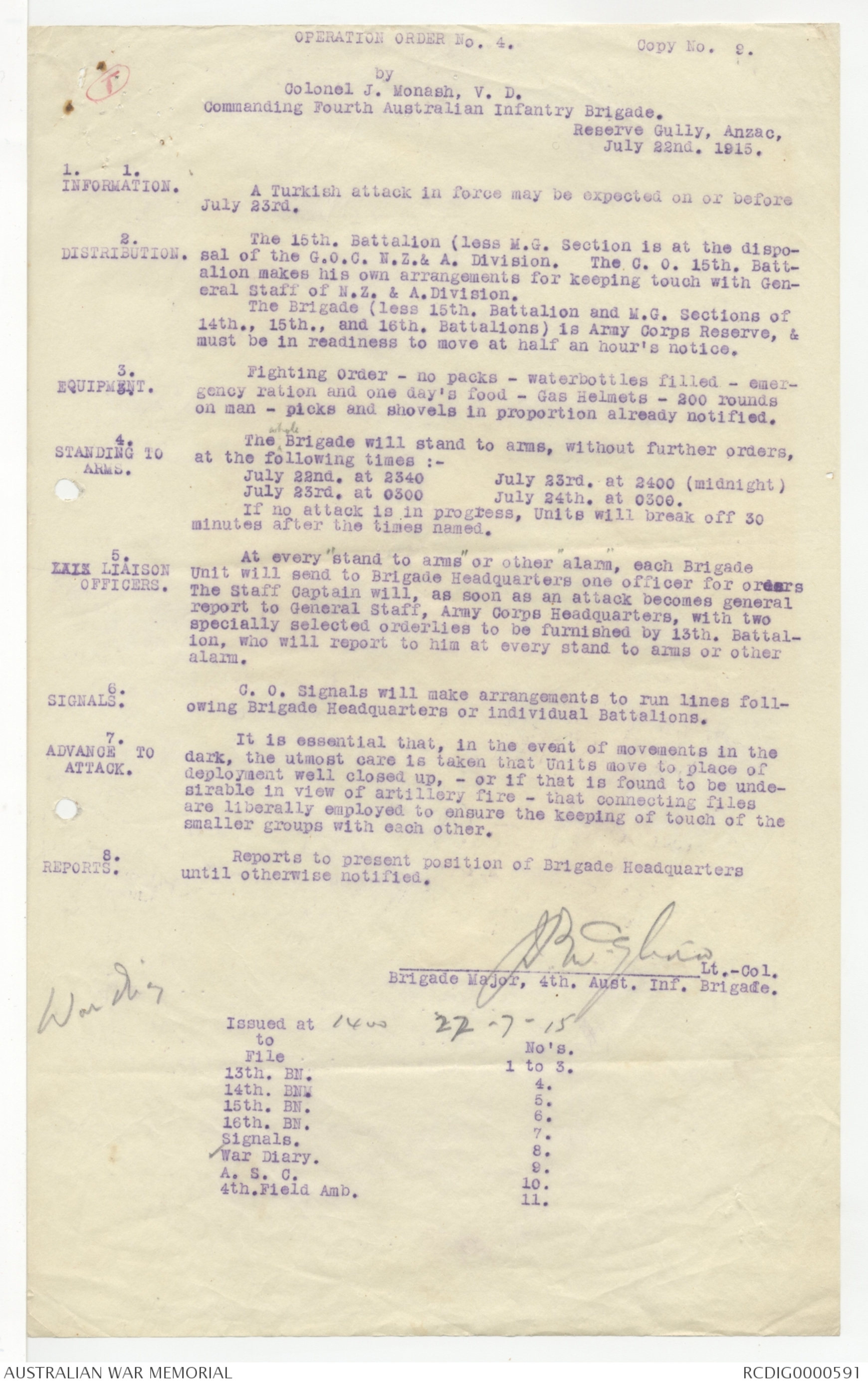
[[18]]
Headquarters
N. Z. & A. Division;
Pursuant to para 2, E.Z.G. 623, (secret
memo) of 20/7/15, direction is sought as to whether the following
Fatigues ^ or which of them at present being furnished by this Brigade are to be
suspended over the period 22nd. and 23rd. instant.
| Strength. | ||||||
| Nature of Duty. | Officers. | NCO's. | Men. | Total. | Remarks. | |
| [*R*] | Sanitary Fatigue. |
|
2 |
19 |
21 |
|
| [*R*] | Beach Party. |
2 |
9 |
155 |
166. |
|
| [*Off 22/23*] | Inner Defences Working Party. |
1 |
2 |
48 |
51 |
|
| [*R*] | Pumping Party. |
|
1 |
16 |
17 |
|
| [*Off for 22/23*] | Guard Supply Depot. |
|
2 |
8 |
10 |
|
| Guard. (A.P.M.) H.Q.Div. |
|
2 |
12 |
14 |
||
| [*Optional*] |
{Guard (Well, Reserve {Gully)
|
|
1 |
3 |
4 |
|
| {Picquet |
|
2 |
6 |
8 |
||
| [*Available when out at work*] | {Bomb Factory. |
|
4 |
75 |
79 |
|
| Bomb Factory. |
|
4 |
75 |
79 |
||
| [*To be divided*] | Working Party. Supply Ofer. |
|
1 |
10 |
11 |
|
| [*R*] | Guard. * |
|
1 |
6 |
7. |
|
| [*Off 22/23*] | Special Terracing Work. |
39 |
|
1200 |
1239 |
|
| [**Shrapnel Point.*] | Totals. |
42 |
31 |
1633 |
1706. |
|
Reserve Gully, Anzac Beach,
Gallipoli Peninsula.
21st. July, 1915
Colonel.
Commanding 4th. Aust. Inf. Brigade.
"C" Form (Duplicate)
Army Form C.2123.
MESSAGES AND SIGNALS.
No. of Message ...........................
GM 6.50p.
Charges to Pay.
£ s. d.
Office Stamp.
(35)
21/2/15 BG
Service Instructions.
Handed in at ............NZ............. Office.....6.50p............................m. Received.......2p...........m.
| TO | 4th Btn | ||
|
Sender's Number NZ A 214 |
Day of Month 21 |
In reply to Number 16 |
A A A |
Sanitary fatigue beach party
pumping party & Guard at SHRAPNEL
point cannot be interfered
with under any circumstances
and must remain AAA. The bomb
factory parties will be available
for fighting with their battalions
except when actually at the
bomb factory AAA. The Guard at
Well and picquet on communications
trench can remain on or not at
your discretion provided they are
available to fight AAA the Guard
supply depot. The Special Terracing
parties and the inner defences
working party will be taken
"C" Form (Duplicate)
Army Form C.2123.
MESSAGES AND SIGNALS.
(34)
Service Instructions.
Handed in at ............NZ............. Office.....6.50p............................m. Received.......2p...........m.
| TO | |||
|
Sender's Number
|
Day of Month 2 |
In reply to Number
|
A A A |
off for 22nd and 23rd AAA.
The fatigue of one NCO & ten
men will be permanently discontinued
from this date
Bm 479
FROM NZ A Div Anzac Cove
PLACE & TIME
"A" Form (Duplicate)
Army Form C.2121.
MESSAGES AND SIGNALS.
Recd. at .........................................m
Date....................................................
From.....................(36)...............................
By............................................................
-
TO OC
13th Bn
14th
15th Bn
16th Bn
[[** 15th Bn]]
Sender's Number
Bm 479A
Day of Month
Twenty one
In reply to Number
NZ A Div
AAA
For the reasons explained this Day
to Conference of O C Battalions
the work of constructing Terraced
Bivouacs will be suspended from
0400 tomorrow 22nd till further notice notice.
Requisitions for working parties
for above are cancelled and the
tentative arrangements for the move
of portions of 13th and 14th Bns are
also Suspended.
From JP McGlinn Lieut, Colonel,
BRIGADE MAJOR, 4TH. INF. BRIGADE,
Place AUSTRALIAN IMPERIAL FORCE.
Reserve Gully Anzac
Time 21 JUL 1915
Date uncertain
probably May/1915.
The Heroes of Australasia.
IMPRESSIVE SERVICE AT
ST PAUL'S.
THE PRIMATE'S ADDRESS.
An impressive service was held in St Paul's
Cathedral yesterday evening in memory of the
men of Australia and New Zealand who have
fallen in the war. The Archbishop of Canterbury
delivered the address ; the Bishop of London
pronounced the Blessing. and the Dean of St. Paul's
read the lesson. The great Church was crowded ;
and among those present were Lord Kintore
(representing the King), Colonel Streatfeild
(representing Queen Alexandra), Colonel
Dalrymple White (Grenadier Guards), the Lord
Mayor, who attended in state, and many
distinguished Australians and New Zealanders,
including :—
The High Commissioner for Australia, New
Zealand, Canada, and South Africa, the Agents-
General of the Australian States, Lord
Lincolnshire, Sir Edmund and Lady Barton,
Brigadier-General J. M. Gordon, Lord and
Lady Sydenham, Mrs. Parker, Admiral Sir
Lewis Beaumont, Lord and Lady Brassy,
Admiral Sir George and Lady King-Hall,
General Sir Edward and Lady Hutton, Lord
and Lady Lindsay, Lady Birdwood, Lady Patey,
Admiral the Hon. Sir Edmund and Lady
Fremantle, Admiral Sir Cyprian Bridge, Lady
Darnley, Lord Harrowby, Admiral Sir Wilmot
Fawkes, Lord Tennyson, Sir Wiliam and Lady
MacGregor, and Sir Robert Nevinson.
In the nave there were several hundred soldiers,
wounded or whole, of the Australian and New
Zealand contingents, besides a sprinkling of their
Red Cross nurses, and over the choir hung
large banners with the Union Jack and the stars of
Australia and New Zealand. Round the base of
the pulpit was grouped the band of the Grenadier
Guards, splendid in the now so rare scarlet. This
band and the organ played during the time that
elapsed between the opening of the doors and the
first appearance of the long procession of choir
and clergy.
There was no processional hymn ; but the
service opened with "Brief life is here our
portion"; and this choice was typical of much
in the musical portion of the ceremony. In the
short special service arranged for the occasion
there were only a few prayers and responses, all
directed to the particular intention.
THE SERMON.
The Archbishop of Canterbury, who took for
his text St. John xv. 13, "Greater love hath no
man than this, that a man lay down his life for
his friends," said in the course of his sermon :—
We are met to-night for a definite and a very
sacred purpose. Here at the centre and hub of
the Empire's life we desire to thank God together
for the splendid devotion of our brothers from
Australia and New Zealand who in the cause
whereto we, as a people, have set our hand
regarded not their lives unto the death. Just two
centuries ago the Christian philosopher George
Berkeley, a singularly clear thinker, was standing,
as he tells us, in St. Paul's Cathedral, where he
noticed a little fly crawling on one of those great
pillars. Here, he thought, is the likeness of each
human being as he creeps along. The sorrow
which, like some dreadful precipice, interrupts
our life may turn out to be nothing but the joining
or cement which binds the portions and
sections of the greater life into one beautiful and
harmonious whole. The dark path may be but
the curve which in the full daylight of a brighter
world will be seen to be the inevitable span of
some majestic arch.
But in this great gathering to-night we want
another note besides that. We must have the
triumph-note for those whose self-sacrifice has
meant so much to their country and to us who
honour them. Among the lives laid down could
be found, as always, bright examples of the young
leadership to which we had looked for upholding
among fellows the spirit which sets manliness
upon the surest basis, the basis of personal
loyalty to Christ. For those lives and for the
footprints which they have left upon the sands of
time we give praise to God to-day. But it would
be unnatural, untrue, to claim for all who thus
gave their lives in their country's cause the
character of stainless purity, or of the saintliness
which we sing of in our hymns. Some of them,
perhaps many of them, were not saints at all.
They were manly sons of the greatest Empire in
the world. They were brave and buoyant with
plenty of the faults and failures which go so often
with high spirit. They need, as we shall need,
forgiveness and cleansing and new opportunity,
and they are in their Father's keeping and He
knows and cares.
Blow, trumpets, all your exultations blow :
For never shall their aureoled presence lack :
I see them muster in a gleaming row,
With ever-youthful brows that nobler show :
We find in our dull road their shining track :
In every nobler mood
We feel the orient of their spirit glow,
Part of our life's unalterable good.
THE LANDING ON ST. MARKS DAY
Do these words seem to high for what we are
remembering? The feat of arms which was
achieved on the rocky beach and scrub-grown
cliffs of the Gallipoli Peninsula in the grey dawn
of St. Mark's Day, April 25, was a feat we are
assured, whose prowess has never been outshone,
has scarcely ever been rivalled, in military annals.
As the open boats under a hail from hidden guns
poured out their men in thousands on the beach,
below perpendicular cliffs of tangled scrub, the
task of breasting those heights looked to many
expert eyes, a sheer impossibility. But by the
dauntless gallantry of brave men the impossible
feat was accomplished, and the record of those
hours and of the days which followed is now a
portion of our Empire's heritage for ever. And
who did it? It was not the product of the long
discipline of some veteran corps of soldiers. It
was mainly the achievement of men from sheep-
stations in the Australian bush or from the fields
or townships of New Zealand, who a few short
months ago had no dream of warfare as, like other
civilians, they went about their ordinary work.
But the call rang out and the response was ready,
and the result is before us all. These Australians
and New Zealanders are enrolled among the
champions when the Empire, for generations to
come, will delight to honour. One of the best
traits of all is the generous tribute given by each
group to the indomitable valour of the rest. To
quote from the private letter of a young New
Zealander, "the Australians were magnificent, and
deserve every good word that is said of them."
And all unite to praise the officers, midshipmen,
and men who formed the beach parties in that
eventful landing, each boat, we are reminded, "in
charge of a young midshipman, many of whom
have come straight from Dartmouth after only a
couple of terms." But of necessity it was at
fearful cost that these gallant deeds were done,
and the great roll of drums under this dome tonight
will reverberate our reverent and grateful
sympathy to the Empire's furthest bound. This
memorable act of stoutest service gives response
already to the rallying call of the Poet-Bishop of
Australia—
By all that have died for men,
By Christ who endured the Cross.
Count noting but honour gained,
Count all that is selfish loss.
Take up with a loyal heart
The burden upon you laid ;
Who fights on the side of God
Needs never be afraid.
Be true to the great good land,
And rear 'neath the southern sun
A race that shall hold its own,
And last till the world be done.
THE SIMPLICITY OF GRANDEUR
Then came the hymn, "Now the labourer's task
is oe'r”; and the Blessing brought the service
proper to a close. Then the drums of the Grenadier
Guards broke into the thrilling prelude to the
"Dead March" in Saul, and when at length the
last sound of the drums and trumpets had died
away, from the far western end of the Cathedral
shrilled the call of the bugler crying the "Last
Post." Last of all came the National Anthem,
played and sung in full.
The service was simple, but with the simplicity
of grandeur. It was the expression of deep and
common feeling. The brave men whom it
commemorated had come from far off to die, far off
both from home and from this central point of the
Empire for whose idea and purpose they have
given their lives ; and last night St. Paul's
Cathedral seemed to speak with the single voice
of the Empire in love and honour of its heroic
children.
R.E. Printing Section, M.E.F.
SPECIAL PASS.
Private L.J.SCOTT, 2nd Battalion, is authorised
to go into the lines of all units by night or by day,
as his duties may require.
He can be identified by the tattooed letters "L.S."
on the right hand above the thumb.
Any officer who examines this pass is to initial
and return it.
Major.
General Staff.
1st Australian Division.
Divisional Headquarters
22nd July, 1915.
H.Q 4th Inf Bde
22-7-15
C.O. 13 Bns
14
15
16
In anticipation of Operation Order to be issued later ^ this day Commanding
officers will forthwith expedite the following matters :—
1. Replenishment of Ammunition, on following basis:—
(a) on the man 200 rounds (not 220 rounds)
(b) in Regimental Reserve 50 rounds per rifle
The Brigade reserve will, after above replenishment, be brought up to 100 rounds.
per rifle.
2. Inspection of Rifles, Bayonets & Entrenching Implements to ensure that
that all are in a fit & serviceable condition
3. Issue & instructions as to wearing & use of Gas Defence Helmets
4. Filling of Waterbottles, & issue of ^ Emergency rations & reserve food in haversacks.
5. Distribution of regimental reserve of picks & shovels, & the drawing (through
Brigade Head Quarters) from the Brigade Tool Reserve, of sufficient ^ additional picks &
shovels, — so as to ensure the following, distributing in equal proportion distributed equally throughout.
the Battalion:—
| 13th Battalion | 100 picks | 100 shovels |
| 14 " | 100 " | 100 " |
| 15 " | 100 " | 100 " |
| 16 " | 80 " | 80 " |
6. Cancel general leave, restrict dispersion of personnel in bathing, ^ water & fatigue
parties; & also concert measures to rapidly concentrate the unit.
7. Perfect arrangements for leaving & details (reduced to the minimum possible)
in charge of battalion property, in the event of the Battalion being ordered
away from the bivouac.
Lt Col
Brigade Major
Copy No
T
Operation order No 4
by
Colonel J. Monash V.D.
Commanding Fourth Australian Infantry Brigade
Reserve Gully, ANZAC
July 22 / 1915.
Information 1. A Turkish attack ^ in force may be expected on or before July 23
Distribution 2. The 15th Battalion ^ (less M. G. section) is at the disposal of the G.O.C. First xxxxx N.Z & A.xxxx Division. — The C.O. 15th Battalion makes his own
arrangements for Keeping touch with this ^ General Staff of N.Z & A Division.—
The Brigade (less 15th Bn & M.G. Sections of 14th, 15th & 16th Bns)
is Army Corps Reserve, & must be in readiness to move at
half an hour's notice.—
Equipment 3. Fighting order — no packs — Waterbottles filled — Emergency ration
and one day's food — gas helmets — 200 rounds on man — Picks &
shovels in proportions already notified.
Standing to Arms 4. The ^ whole Brigade will stand to arms, without further orders, at the
following times:—
July 22 at 2340
July 23 at 0300
July 23 at 2400 (midnight)
July 24 at 0300
If no attack is in progress, units will break off 30 minutes after
the times named.
Liaison offices 5. At every 'Stand to Arms' or other 'Alarm', each Brigade Unit
will send to Brigade Head Quarters one officer for orders. —
The Staff Captain will, as soon as an attack becomes general, report
to General Staff, Army Corps H. Q., with two specially selected orderlies
to be furnished by 13th Battalion, who will report to him at every
'Stand to Arms' or other 'Alarm'.—
Signals. G C. O. Signals will make arrangements to run lines following
Brigade Head Quarters or individual Battalions
P.T.O.
Advance to attack. 7. It is essential that, — in the event of movements in the dark, the
utmost care is taken that units move ^ to place of deployment well closed up,— or if that
is ^ found to be undesirable in view of artillery fire — that connecting files are liberally
employed to ensure the keeping of touch of the smaller groups with
each other.
Reports. 8. Reports to present position of Bgde Head Quarters until
otherwise notified
Lt Col
Brigade Major
4th Aust. Inf. Bde.
Issued at
To File Nos
Officer 1 to 3
13 Battalion 4
14 " 5
15 " 6
16 " 7
Signals 8
War Diary 9
A. S, C. 10 .
4th F Amb. 11
Send Alarm 1512
Gas Alarm 1620
Memo 22 X
Headquarters,
4th Austn. Inf. Bde.
22nd July 1915
C. O.
Battalion,
In anticipation of Operation Order to be
issued later this day, Commanding Officers will forthwith
expedite the following matters:—
1. Replenishment of ammunition on following basis:—
(a) On the man, 200 rounds (not 220 rounds)
(b) In Regimental Reserve 50 rounds per rifle.
The Brigade Reserve will, after above replenishment, be
brought up to 100 rounds per rifle.
2. Inspection of rifles, bayonets and entrenching implements
to ensure that all are in a fit and serviceable condition.
3. Issue, and instructions as to wearing and use, of Gas
Defence Helmets.
4. Filling of Water-bottles and issue of emergency rations
and reserve food in haversacks.
5. Distribution of Regimental Reserve, of picks and shovels
and the drawing (through Brigade Headquarters) from the
Brigade Tool Reserve of sufficient additional picks and
shovels so as to ensure the following distributed equally
throughout the Battalion:—
13th Battalion 100 picks and 100 shovels
14th Battalion 100 picks and 100 shovels
15th Battalion 100 picks and 100 shovels
16th Battalion 80 picks and 80 shovels
6. Cancel general leave, restrict dispersion of personnelx in
bathing, water, and fatigue parties; also concert measures
to rapidly concentrate the unit.
7. Perfect arrangements for leaving details (reduced to the
minimum possible) in charge of Battalion property, in the
event of the Battalion being ordered away from the bivouac.
JP McGlinn
Lieut. Colonel
Brigade Major, 4th Inf. Bde
003
OPERATION ORDER No. 4.
Copy No. 2.
[T]
by
Colonel J. Monash, V. D
Commanding Fourth Australian Infantry Brigade.
Reserve Gully, Anzac,
July 22nd. 1915.
1. 1.
INFORMATION.
A Turkish attack in force may be expected on or before
July 23rd.
2
DISTRIBUTION
The 15th. Battalion (less M.G. Section is at the disposal
of the G.O.C. N. Z. & A. Division. The C. 0. 15th. Battalion
makes his own arrangements for keeping touch with General
Staff of N. Z. & A. Division.
The Brigade (less 15th. Battalion and M.G. Sections of
14th., 15th., and 16th. Battalions) is Army Corps Reserve, &
must be in readiness to move at half an hour's notice.
3.
EQUIPMENT
Fighting order - no packs - waterbottles filled - emergency
ration and one day's food - Gas Helmets - 200 rounds
on man - picks and shovels in proportion already notified.
4.
STANDING TO
ARMS
The ^whole Brigade will stand to arms, without further orders,
at the following times :-
July 22nd. at 2340 July 23rd. at 2400 (midnight)
July 23rd. at 0300 July 24th. at 0300.
1f no attack is in progress, Units will break off 30
minutes after the times named.
5.
LIAS LIAISON
OFFICERS
At every "stand to arms" or other "alarm", each Brigade
Unit will send to Brigade Headquarters one officer for orders
The Staff Captain will, as soon as an attack becomes general
report to General Staff, Army Corps Headquarters, with two
specially selected orderlies to be furnished by 13th. Battalion,
who will report to him at every stand to arms or other
alarm.
6.
SIGNALS
C. O. Signals will make arrangements to run lines following
Brigade Headquarters or individual Battalions.
7.
ADVANCE TO
ATTACK
It is essential that, in the event of movements in the
dark, the utmost care is taken that Units move to place of
deployment well closed up, - or if that is found to be undesirable
in view of artillery fire - that connecting files
are liberally employed to ensure the keeping of touch of the
smaller groups with each other.
8.
REPORTS
Reports to present position of Brigade Headquarters
until otherwise notified.
JP McGlinn Lt.-Col.
Brigade Major, 4th. Aust. Inf. Brigade
[*War diary*]
Issued at 1400 22-7-15
to No's
File 1 to 3..
13th. BN. 4.
14th. BN. 5.
15th. BN. 6.
16th. BN. 7.
Signals. 8.
✓War Diary 9.
A. S, C. 10.
4th.Field Amb. 11.
 Marj Moodie
Marj MoodieThis transcription item is now locked to you for editing. To release the lock either Save your changes or Cancel.
This lock will be automatically released after 60 minutes of inactivity.